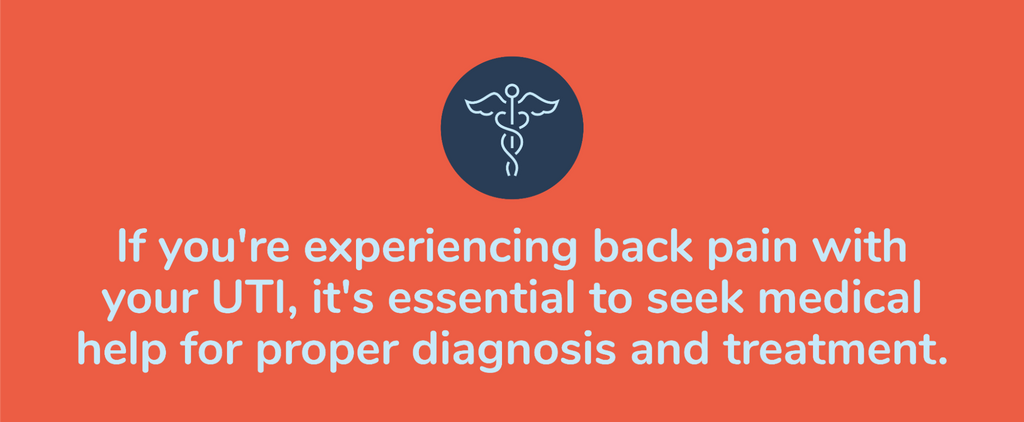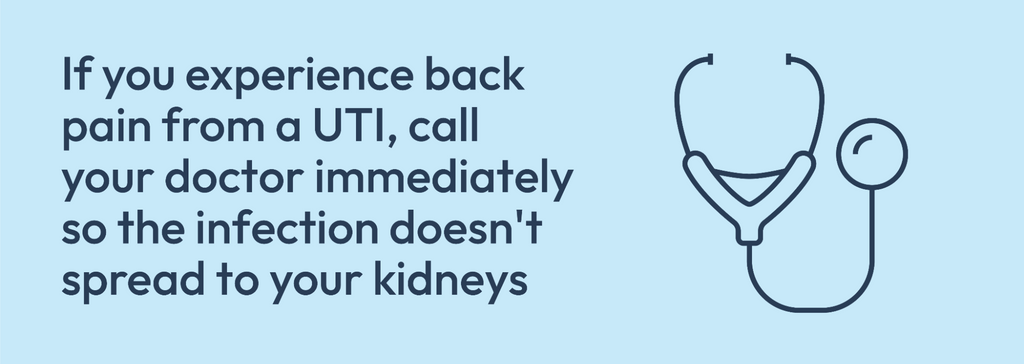Free U.S. shipping & money back guarantee

4 min read
| March 07, 24
Do UTIs Cause Back Pain?
Article summary
We’re here to support you on every step of your journey, including understanding how UTIs symptoms can show up for different people. UTIs can often feel debilitating, and adding back pain into the mix can make you feel even worse. If you notice a dull, aching pain or sharp discomfort in your back while dealing with a UTI, it's important to seek treatment from your healthcare provider. This way, you can mitigate the infection from becoming more severe.

Why do customers love Uqora?
Innovative urinary care
Research-backed products
Money-back guarantee
Article contents
Article contents
A urinary tract infection (UTI) is a bacterial infection that affects your urinary system, including your bladder, urethra, ureters, and kidneys (1).
Due to the interconnected nature of your urinary system – when harmful bacteria enter through the urethra, they can travel up the ureters and potentially reach the kidneys, resulting in a more severe infection. An often prominent sign of this progression could be the presence of back pain (1).
In this article, we'll explore how UTIs are connected to back pain. We'll also talk about the common signs of UTIs, what might increase your chances of getting one, and ways to get proactive about your urinary health. We’re here to support you on every step of your urinary health journey – let’s dive into understanding more about the symptom of back pain.

How UTIs lead to back pain
When bacteria enter the urethra and multiply in the bladder, they cause inflammation and irritation, leading to a UTI.
If UTIs are left untreated, or if the infection spreads to the kidneys, it can result in a complication called pyelonephritis(2).
Pyelonephritis can cause significant discomfort and pain in the lower back, often on one side. This pain is typically referred to as ‘flank’ pain and could be accompanied by other symptoms like fever, chills, and frequent urination (2).
How do I know if my back hurts because of a UTI?
Back pain caused by a UTI might feel like a dull ache in your lower back that comes and goes, as well as radiating pain in your groin and abdomen. Some people may experience throbbing sensation and constant discomfort (3). But how can you tell if that pain is the result of a urinary tract infection?
One way to tell if your back ache could be a result of a UTI is to monitor whether the pain is accompanied by other symptoms indicative of an infection, including (1,4):
- Vomiting
- High fever
- Chills
- Pain
- Tenderness
- Burning or stinging while urinating
- Increased need to urinate
- Cloudy or bad-smelling urine
- Blood in your urine
- Fatigue
If you are experiencing back pain and/or any additional symptoms, it’s important that you visit your doctor for medical treatment and support.
How to treat back pain as a result of UTI
Addressing back pain associated with UTIs will require a visit to the doctor. Proper diagnosis and prescription for the right antibiotics for the infection are essential components of effective treatment. Completing the full course of antibiotics is also crucial to fight off the infection.
Healthcare providers may suggest additional treatment for specific symptoms, like back pain. They could suggest medical treatments like pain relievers for UTI-related back pain. In addition to these medical interventions, it could be recommended to stay well-hydrated and get plenty of rest to help improve comfort and recovery(5).

Preventing a UTI
At Uqora, we believe in getting proactive about urinary tract health. It's important to keep in mind that everyone's body is unique, so even if you feel like you’ve been doing all the ‘right’ things – some people may be more susceptible to UTIs than others.
We know you may have heard all these tips before, but they are still important to remind ourselves of some of the ways that support proactive urinary tract health.
Stay Hydrated
Staying hydrated can be helpful to regularly flush out any potential bacteria in the urinary tract. Try drinking plenty of fluids, especially water (1).
Maintaining your hygiene practices
You may have been reminded of ‘wiping front to back’ before – but why is this tip mentioned time after time? We hear this one so often because E. coli , a bacteria commonly found in the gastrointestinal tract and associated with bowel movements, can be a source of infection (1).
Also, if you're someone who is more prone to UTIs, it can be helpful to change your menstrual products more often during your period.
Urinate after sex (& other triggers you may have)
Urinating is your body's first defense against bacteria. When you urinate, there’s a chance to flush out potentially harmful bacteria from your urinary tract, so making sure to urinate regularly can help lower the risk of UTIs. Also, don’t forget to use the restroom after sex (1).
Clothing adjustments
For those who are prone to UTIs, you could also consider switching to cotton underwear and loose fitting clothing to help prevent any moisture from accumulating and causing bacterial overgrowth (6).
Lubricants and condoms
Anything that comes into contact around the urethra can impact urinary health. So the products we use in or near the vagina, can impact urinary health too. You can consider switching to a water-based lubricant for sexual activities. It’s also advised to avoid using spermicides if you are more prone to UTIs (1).
When to Seek Medical Help for UTI Back Pain
If you have a UTI and symptoms are either not improving or getting worse, we recommend you seek treatment immediately. Other symptoms that may affect someone with a UTI include (1):
- Severe or worsening back pain
- Fever
- Pain
- Chills
- Nausea
- Blood in the urine
- Consistent burning pain when urinating or frequent urges to urinate
If you experience recurring UTIs, as in your UTIs keep coming back after treatment, we encourage you to. Speak with your doctor as soon as possible to make sure you get the care you deserve. We created a helpful resource to have conversations with your doctor here.
Final Thoughts
Back pain could be an indication that your UTI is spreading to your kidneys. If you’re experiencing pain in your lower back, along with other UTI symptoms, seek medical advice and treatment as soon as possible.
UTIs are common, and even when taking the best proactive measures, they can still develop. Some people just need more support! Remember knowledge is power when it comes to your health so you’re on the right track in finding solutions that work best for you. We’re here for you every step of the way.
Note: references to "female", “women”, “male”, and “men” in this article refer to sex assigned at birth, not gender.
This article does not replace medical advice. We recommend you seek treatment if you think you are experiencing a UTI.
References
- Urinary tract infection (Uti)—Symptoms and causes. (n.d.). Mayo Clinic. Retrieved December 29, 2023, from https://www.mayoclinic.org/diseases-conditions/urinary-tract-infection/symptoms-causes/syc-20353447
- Belyayeva M, Jeong JM. Acute Pyelonephritis. [Updated 2022 Sep 18]. In: StatPearls [Internet]. Treasure Island (FL): StatPearls Publishing; 2023 Jan-. Available from: https://www.ncbi.nlm.nih.gov/books/NBK519537/
- Upper back pain with uti: Cause, treatment, medical attention. (2023, October 3). Healthline. https://www.healthline.com/health/upper-back-pain-uti
- Kidney infection—Symptoms. (2018, January 8). Nhs.Uk. https://www.nhs.uk/conditions/kidney-infection/symptoms/
- Kidney infection—Treatment. (2018, January 8). Nhs.Uk. https://www.nhs.uk/conditions/kidney-infection/treatment/
- Urinary Tract Infections. Hopkins Medicine. https://www.hopkinsmedicine.org/health/conditions-and-diseases/urinary-tract-infections
